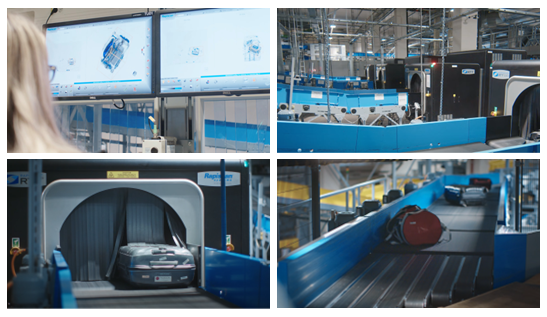This research study addresses Chapter 6 ‘Impact of security measures on safety’ of Cluster 5 'Climate, Energy and Mobility' of the Horizon Europe Work Programme 2021-2022.
In December 2022, the European Union Aviation Safety Agency (EASA) appointed a consortium to deliver this research study for the specific case of detecting lithium batteries in checked baggage. The consortium is led by Rapiscan Systems and supported by CAA International (CAAi).
Background
Lithium batteries are becoming more and more ubiquitous in portable electronics and electrical devices. Their diverse form factors and favourable energy storage characteristics make them the prime choice of batteries in many applications. Yet the high density of stored energy along with the combustion characteristics of lithium also constitute a risk. This risk is particularly evident in the aviation field onboard the aircraft, and in particular in the hold, where fire hazards pose particularly severe risks to the aircraft.
Certain restrictions apply to the carriage by passengers of lithium metal and lithium-ion batteries in accordance with International Civil Aviation Organization (ICAO) Annex 18 and the ICAO Technical Instructions for the Safe Transport of Dangerous Goods (ICAO Doc 9284). Enforcing such regulation requires means to detect the presence of unwanted lithium batteries in the baggage.
Objectives
The main objective of the project is to evaluate the feasibility of the detection of lithium batteries transported as checked baggage, using the security screening equipment and processes in operation at airports. The project should investigate what are the technical, operational, and regulatory solutions available, to support safety-related requirements without affecting the performance of security operations as well as to identify the main limitations, constraints, and financial cost elements for their implementation at European airports. The project shall also study potential developments of technology and solutions for application to other transport scenarios (e.g. cargo, cabin baggage).
Screening equipment
Notwithstanding that screeners shall primarily focus their attention on identification of prohibited items from a security perspective, there is a need to investigate possible technical, operational, and regulatory solutions to support safety requirements (in particular detection of lithium batteries that are not transported in line with applicable safety rules) without affecting the performance of screening operations.

Rapsican screening equipment
Main tasks/deliverables
Four technical tasks have been identified to cover the scope of the activity and fulfil the project objectives:
- Task 1: Review of state-of-the-art solutions, development of test plan and protocol, and consultation with stakeholders;
- Task 2: Performance of tests, collection of data;
- Task 3: Analysis of tests performed, consultation with stakeholders; and
- Task 4: Conclusions and recommendations.
Workshops & Consultations
- Project launch meeting with EASA; and
- Two workshops / consultations with stakeholders to present the results of Tasks 1 and 3.
Main Conclusions
The main conclusions of the project can be summarised as follows:
- Addressing the lithium battery risk is important for global aviation safety goals.
- Consultation with aviation industry stakeholders and regulatory bodies has highlighted the need for cohesive regulations, comprehensive education, and collaborative efforts across industry.
- A screening solution via use of a lithium battery detection algorithm has been trialled.
- The lithium battery detection algorithm shows capability of detecting relevant lithium batteries.
- Screeners can successfully perform the task of lithium battery detection using the algorithm.
- The lithium battery detection algorithm has an impact on airport operations.
- The algorithm may enhance security threat detection.
- This technology can become available for the detection of non-compliant carriage of lithium batteries at aerodromes.
- Further research is needed on the capability of the algorithm, operational impacts, and the legislative framework.
Overall Recommendations
- Conduct additional research to steer future developments in an informed manner. Consider the expansion of the research scope to other dangerous-goods screening capabilities.
- Provide screeners with the required awareness of the existing rules concerning dangerous goods, and lithium batteries in particular.
- Explore options for the future regulatory framework based on additional data.
- Consider the use of hold baggage screening equipment to detect non-compliant lithium batteries.
Research Project details
 This project will be funded from the European Union's Horizon Europe research and innovation programme.
This project will be funded from the European Union's Horizon Europe research and innovation programme.
At Rapiscan Systems Limited
Project Manager: Sarah Fox, sarah.fox [at] caa.co.uk
Technical lead: Dean Smith, DeSmith [at] osi-systems.com (Rapiscan)
Consortium members: CAA International
At EASA
Project manager: Simone Schwerdorf, simone.schwerdorf [at] easa.europa.eu
Technical lead: Adam Borkowski, adam.borkowski [at] easa.europa.eu
Technical expert: Lia Calleja-Barcena, lia.calleja-barcena [at] easa.europa.eu
Technical expert: Vasileios Papageorgiou, Vasileios.papageorgiou [at] easa.europa.eu